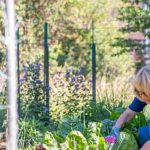Wild turkeys are a common sight in many areas, and it’s natural to wonder about their impact on gardens. With the question “Do wild turkeys eat vegetables in gardens?” on many homeowners’ minds, it’s essential to explore their behavior and dietary habits. Understanding how wild turkeys interact with garden vegetation can help homeowners mitigate potential damage and find a balance between coexisting with these birds while preserving their garden harvest.
While some may enjoy seeing wild turkeys roaming through their yards, others may be concerned about the potential damage they can cause to garden vegetables. Exploring the behavior of wild turkeys in gardens can provide valuable insight into developing effective strategies for protecting your plants.
From understanding what types of vegetables they consume to legal considerations for managing wild turkey populations, there are many factors to consider when it comes to coexisting with these birds. In this article, we’ll delve into the dietary habits of wild turkeys and the impact they can have on garden vegetation, providing essential information for homeowners looking to protect their gardens while maintaining biodiversity.
Understanding the Dietary Habits of Wild Turkeys
Wild turkeys are omnivorous birds that have a varied diet consisting of seeds, fruits, insects, and small vertebrates. They are known to forage in open fields and woodlands, but they have also been observed venturing into gardens in search of food. One of the primary concerns for gardeners is whether wild turkeys eat vegetables, which can lead to damage and loss of crops.
Research has shown that wild turkeys do indeed eat vegetables in gardens. These birds have been known to consume a wide variety of vegetables, including lettuce, spinach, beans, peas, and tomatoes. Their feeding habits can be particularly destructive during certain times of the year when food sources are scarce. Understanding the dietary preferences and behavior of wild turkeys is essential for implementing effective strategies to protect your garden.
Gardeners often experience frustration when their hard work is ruined by wild turkeys feasting on their vegetable crops. The impact of these birds on garden vegetation can be significant, leading to economic losses and compromised harvests. It is important for gardeners to be aware of the potential threat posed by wild turkeys and take measures to deter them from damaging their gardens.
Impact of Wild Turkeys on Garden Vegetation
Wild turkeys can be a beautiful sight in the wild, but for gardeners, they can be a source of frustration. The impact of wild turkeys on garden vegetation can be substantial, causing significant damage to crops and plants. Understanding their behavior and dietary habits is essential for finding ways to protect your garden from these feathered visitors.
Understanding Wild Turkey Behavior and Feeding Patterns
Wild turkeys are opportunistic feeders, meaning they will eat a variety of foods depending on what is available. This includes seeds, fruits, insects, and yes – vegetables. Their diet can vary based on the season and availability of food sources. In gardens, they may target a wide range of vegetables including lettuce, beans, tomatoes, and berries.
Impact on Garden Vegetation
For gardeners, the presence of wild turkeys can result in significant damage to crops and ornamental plants. They have been known to peck at fruits and vegetables, trample through delicate seedlings, or scratch up the soil in search of insects. This not only affects the aesthetics of the garden but also impacts its productivity.
Strategies for Protecting Your Garden
There are several strategies that gardeners can employ to protect their gardens from wild turkey damage. This may include installing physical barriers such as fences or netting, using scare tactics like noise makers or visual deterrents, and choosing plant species that are less appealing to wild turkeys. Additionally, practicing good garden hygiene by promptly cleaning up any fallen fruits or vegetables can help reduce their attraction to your garden.
Identifying Common Vegetables That Wild Turkeys Are Known to Consume
Wild turkeys are known to have an omnivorous diet, and they will consume a variety of plant matter, seeds, insects, and small amphibians. This can become a concern for gardeners, as wild turkeys have been known to cause damage to gardens by consuming vegetables and other plants. So, do wild turkeys eat vegetables in gardens? The answer is yes, they do.
Some common vegetables that wild turkeys are known to consume include lettuce, spinach, tomatoes, and strawberries. These are just a few examples of the wide array of vegetation that may be at risk when wild turkeys are present in or near your garden. As these birds roam freely and feed on whatever they find suitable, it’s essential for gardeners to take preventive measures to protect their crops from potential damage.
One strategy for protecting your garden from wild turkey damage is installing physical barriers such as fences or netting around the perimeter of the garden. Making use of scare tactics like visual deterrents or noise-making devices can also help keep wild turkeys away from your vegetable patches. By employing these strategies and being mindful of the types of plants that attract wild turkeys, gardeners can minimize the risk of their crops being consumed by these omnivorous birds.
| Vegetable | Attractiveness to Wild Turkeys |
|---|---|
| Lettuce | High |
| Spinach | Moderate |
| Tomatoes | Low |
Strategies for Protecting Your Garden From Wild Turkey Damage
Physical Barriers
One effective strategy for protecting your garden from wild turkey damage is to install physical barriers. This can include fencing off your garden area with chicken wire or mesh netting to prevent turkeys from accessing your vegetables. Make sure the fencing is at least 4-5 feet tall to deter the turkeys from jumping over it. You can also consider using scare devices such as hanging shiny objects or wind chimes to keep wild turkeys away from your garden.
Implementing Repellents
There are various commercial repellents available that can be effective in deterring wild turkeys from entering your garden. These repellents often contain natural substances like capsaicin, a compound found in chili peppers, or putrescent egg solids which deter the turkeys due to their strong odors and taste. Be sure to follow the application instructions carefully and reapply as directed for continued protection of your garden.
Modify the Garden Landscape
Another approach is to modify your garden landscape in ways that make it less appealing to wild turkeys. For example, consider planting a diverse range of vegetation and creating sensory distractions such as visual barriers and noise deterrents.
Additionally, maintaining regular upkeep in your garden by promptly removing fallen fruits and vegetables can help discourage wild turkeys from frequenting the area. By making these modifications, you can significantly reduce the attractiveness of your garden to wild turkeys without causing harm to them.
Ecological Significance of Wild Turkeys and Their Role in Maintaining Garden Biodiversity
Wild turkeys play an important role in maintaining garden biodiversity. While they are known for consuming a variety of vegetation, including vegetables, their foraging habits have ecological significance in the garden ecosystem. Here are some key points to consider about the impact of wild turkeys on garden biodiversity:
- Seed dispersion: Wild turkeys help disperse seeds as they forage, which can contribute to the spread and regeneration of plant species within the garden. Their movement and feeding patterns can aid in the dispersal of seeds across different areas, promoting plant diversity.
- Insect control: Despite being known to consume vegetables, wild turkeys also feed on insects and small invertebrates. By doing so, they help regulate insect populations within the garden, contributing to a balanced ecosystem that supports both plant and animal life.
- Soil disturbance: The scratching and pecking behavior of wild turkeys can lead to soil disturbance, which in turn can benefit the growth of certain plants by aerating the soil or exposing nutrients. This natural form of soil disturbance contributes to the overall health and diversity of the garden environment.
While it’s important to recognize the positive ecological role that wild turkeys play in gardens, it’s also essential for gardeners to find ways to coexist with these birds while protecting their crops.
- Encouraging habitat diversity: Creating diverse habitats within and around the garden can help attract a variety of wildlife, including wild turkeys. By providing natural food sources and shelter, such as native plants and vegetation, you can support a healthy ecosystem that benefits both wildlife and your garden.
- Implementing deterrents: Using physical barriers like fencing or netting can help protect specific areas of the garden from wild turkey foraging. Additionally, employing scare tactics or noise deterrents may discourage these birds from frequenting certain areas without causing harm.
- Practicing sustainable gardening: Implementing practices such as crop rotation, companion planting, and organic pest control methods can help maintain a balanced environment that supports both plant growth and wildlife presence.
By understanding the ecological significance of wild turkeys in maintaining garden biodiversity and implementing strategies for coexistence, gardeners can strike a balance between preserving their harvests while supporting a healthy ecosystem.
Legal Considerations and Regulations for Managing Wild Turkey Populations in Gardens
Wild turkeys are an iconic species across the United States and have become a common sight in many suburban and rural gardens. As their population continues to thrive, it has become increasingly important for homeowners to understand the legal considerations and regulations surrounding the management of wild turkey populations in their gardens.
There are federal laws and regulations that govern the management of wild turkeys, as well as specific guidelines at the state level. It is crucial for gardeners to familiarize themselves with these laws to ensure that they are compliant while also protecting their property from potential damage caused by wild turkeys.
Here are some important legal considerations and regulations to keep in mind when managing wild turkey populations in your garden:
- The Migratory Bird Treaty Act (MBTA) protects wild turkeys and other migratory birds from being hunted or captured without proper permits. This means that you cannot take matters into your own hands if you experience issues with wild turkeys in your garden.
- Some states have specific hunting seasons for wild turkeys, and permits may be required to hunt or trap them if they become a nuisance on your property. It is essential to check with your state wildlife agency for guidelines on managing wild turkey populations.
Understanding these legal considerations and regulations is essential for maintaining a harmonious relationship with wild turkeys while also protecting your garden. By following these guidelines, gardeners can navigate the complexities of coexisting with wildlife while preserving their beloved plants and vegetables.
Overall, striking a balance between respecting the ecological significance of wild turkeys and safeguarding your garden harvest is key. Gardeners should strive to coexist with these magnificent birds while also taking necessary measures to protect their property within the confines of the law.
Conclusion
In conclusion, understanding the behavior and dietary habits of wild turkeys is crucial for finding a balance between coexisting with these birds and preserving your garden harvest. While it is true that wild turkeys do eat vegetables in gardens, there are strategies that gardeners can employ to minimize damage and protect their crops.
By identifying common vegetables that wild turkeys are known to consume, gardeners can implement specific measures to deter these birds from their gardens. This might include using physical barriers such as fences or netting, as well as employing scare tactics like noise-makers or visual deterrents. It’s also important to consider the ecological significance of wild turkeys and their role in maintaining garden biodiversity. Finding ways to peacefully coexist with these animals while safeguarding your garden is key.
Furthermore, it’s essential for gardeners to be aware of any legal considerations and regulations regarding the management of wild turkey populations in gardens. By staying informed about local laws and guidelines, individuals can ensure that they are taking the appropriate steps for both protecting their harvest and respecting wildlife conservation efforts. Ultimately, finding a balance between coexisting with wild turkeys and preserving your garden harvest involves thoughtful planning, proactive measures, and a respectful approach towards wildlife.
Frequently Asked Questions
Will Turkeys Eat My Vegetable Garden?
Turkeys are known to eat a wide variety of plants, including vegetables. If you have a vegetable garden, there is a possibility that turkeys might feed on your crops, especially if they don’t have other food sources available.
What Vegetables Do Wild Turkeys Eat?
Wild turkeys have a varied diet that includes different types of vegetation. They are known to consume fruits, nuts, seeds, and also certain types of vegetables like lettuce, kale, and tomatoes.
Will Wild Turkeys Destroy a Garden?
While wild turkeys can cause some damage to gardens by feeding on plants and digging for insects, they typically do not completely destroy them. Using deterrents such as fencing or scare tactics can help protect your garden from these birds without causing harm to the turkeys themselves.

If you’re looking to get into vegetable gardening, or are just looking for some tips on how to make your current garden better, then you’ve come to the right place! My name is Ethel and I have been gardening for years. In this blog, I’m going to share with you some of my best tips on how to create a successful vegetable garden.





